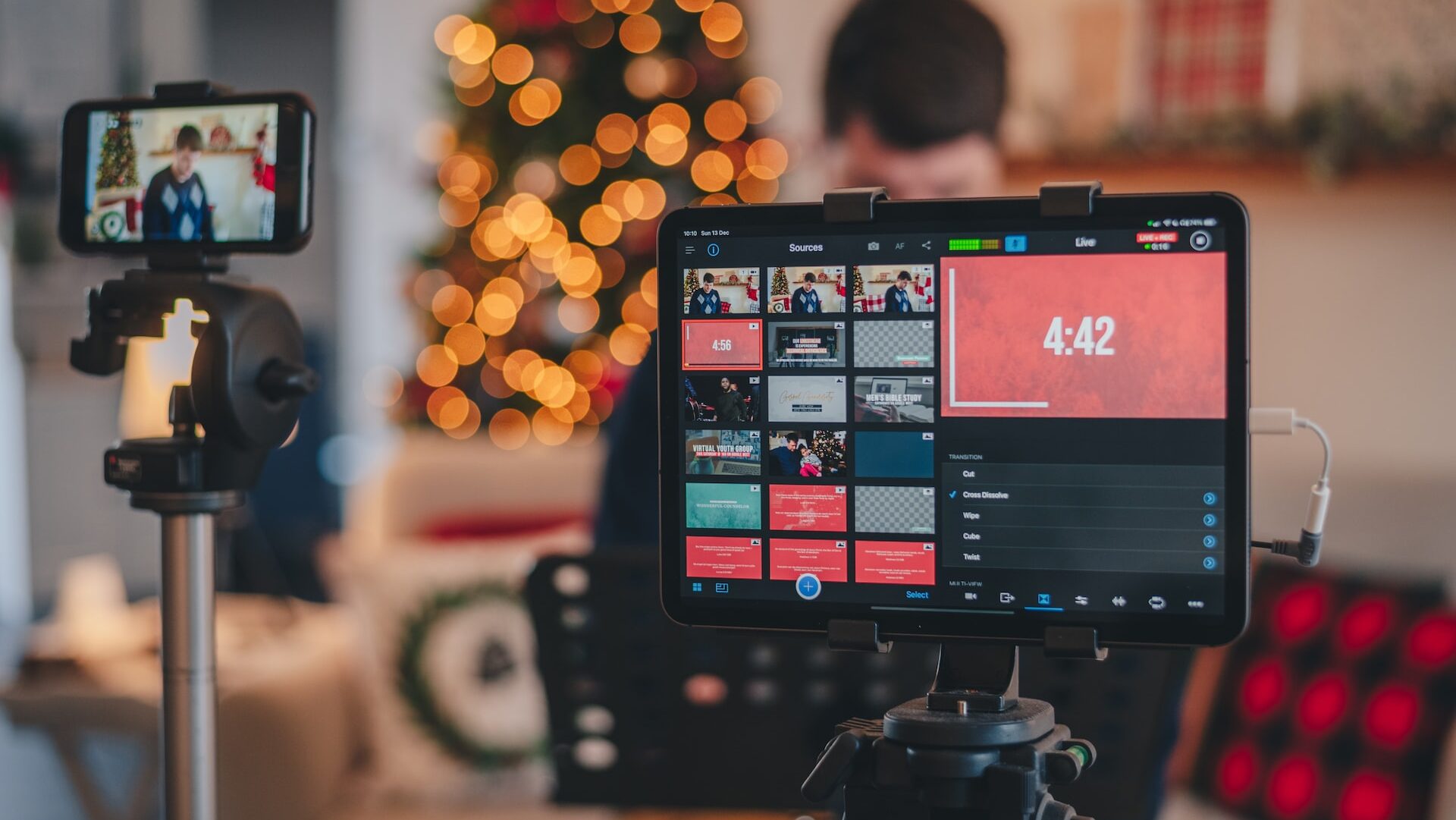We’re living in a golden age of virtual events.
By 2032, the global market for virtual events is expected to reach an astronomical $889 billion — and from where we’re sitting, it’s not hard to see why.
Virtual events are often cheaper and less complicated to set up than in-person events, and they open your events up to attendees from all over the world. But we know it can be tricky knowing where to get started when setting up a new virtual event.
That’s why we’ve created this guide.
Read on to find out what it takes to successfully plan your next virtual event and get pro tips on how to market your event, how to use market research to boost ticket sales, and what to look for in the best software providers.
Table of contents
Why should you organize virtual events?
What are the different types of virtual events?
How to make your virtual events more engaging and meaningful
How to market and promote your virtual event

Why should you organize virtual events?
Virtual events are in huge demand right now. Market analysts are expecting the virtual events industry to grow by 19.5% between 2024 and 2032. As an event organizer, you can’t afford to miss out on an opportunity like that.
By unlocking this ever-increasing market for virtual experiences, you’ll leverage a ton of benefits for your events business in 2024 and beyond. Let’s take a look at what you stand to gain.
Virtual events can be more accessible
By taking your event online, you’re opening it up and making your event accessible to a much wider audience — which could ultimately boost your revenue as a virtual event organizer.
For example, virtual events:
- Remove travel barriers: Our Event Trends Report 2023 found that 50% of attendees like virtual events because they can get involved without having to go anywhere.
- Let guests dress down: When we asked virtual attendees what they love about virtual events, 40% said they love that they don’t have to dress up to log into events.
- Virtual events cost less: 45% of event attendees told us virtual events tend to cost less, which opens your event up to a wider range of people.

Virtual events can be more profitable
When you plan a virtual event, your operating costs are often a lot lower than for in-person events or hybrid events. That’s because you don’t have to shell out on:
- Venue hire
- Catering
- Event staff
Meanwhile, you can maximize your ticket sales. Because your event is 100% online, you’re not limited to your venue’s maximum capacity. Pair that sales potential with the reduced costs, and your profit margin has the potential to expand dramatically.
Virtual events make it easier to score a star-studded line-up
Not only do virtual events open your event up to a wider range of guests than physical events, but you also open yourself up to a bigger pool of speakers and entertainers.
By removing travel barriers and minimizing schedule disruption, it’s much easier to secure appearances from industry leaders from all over the world.
This boosts your event’s credibility and delivers added value.
Virtual events offer incredible data
By using virtual event platforms, you’ll have way more data at your fingertips, as all transactions are completed digitally.
Virtual event platforms also make it easy for organizers to track engagement levels because you can see when someone has logged in or out of the event. You can then use that data to improve your future events by looking at the timing of your drop-offs to try to find actionable patterns.
For example, let’s say that 55% of your virtual attendees logged out at the 60-minute mark in your 90-minute Q&A session. If you’ve got another virtual event lined up, you might want to try to limit the session to just an hour instead.
With Eventbrite, you’re able to set up automated reports so you’re always in the loop on sales, attendance, and revenue. But you can also create custom forms for enriched audience data and get live check-in and drop-off figures, so you know how you’re engaging with your audience.

What are the different types of virtual events?
Now that we’ve covered why the virtual events space is a great vertical for you to get involved with in 2024, let’s look at the different types of virtual events to explore.
Virtual conferences
Virtual conferences are online networking events that are popular in the corporate events space and can often be more practical than in-person conferences.
These types of events are great because they provide a networking opportunity for companies worldwide to meet and trade ideas without having to fly a delegation of employees halfway across the world.
If you’re looking for virtual event ideas, Reply.io is a source of best practices.
Their annual conferences were held 100% remotely every October for the past two years. But they included a range of expert panel discussions, masterclasses, and hands-on workshops to keep virtual attendees engaged, learning, and networking at all times.

Virtual trade shows or exhibitions
Virtual trade shows allow businesses to showcase new products, services, or ideas without sending those products out on the road for weeks.
Virtual exhibitions are also great for artists or entertainers looking to maximize their reach to increase brand awareness.
If you need some inspiration, take a look at JobFairX.
Their virtual job fairs enable jobseekers from all over the world to streamline their job search by registering for an online event and conducting interviews with industry experts. The experts then match interviewees with vacancies they’d be a good fit to apply for.
Ready to organize your next virtual event?

Webinars
Webinars are essentially online seminars that allow guests to watch presentations, learn, and engage with one another in a virtual classroom.
Webinars can be the ideal format for a range of event organizers — whether you’re organizing industry seminars, online certification courses, Q&A sessions with book authors, or anything in between.
You just need to partner with the right webinar platform to support your event fully.
To see how webinars are done the right way, Texas Exes’s January 2024 Virtual Lunchtime Lecture is a great example.
This virtual seminar invited people from all over to watch an engaging lecture from a leading academic. Best of all, it was free, maximizing its appeal to interested attendees.
Virtual performances
Not all virtual events revolve around business. You can also organize virtual performances or concerts.
Virtual performances give fans from all over the world a unique opportunity to share an intimate session with talented musicians or artists without having to leave the comfort of their own homes. You must create the right virtual environment for this, provide good quality sound and images, and consider lighting and decor to make it an immersive experience.
You could even give virtual audiences the chance to experience past concerts by live-streaming iconic performances that have already happened. That’s what Washington DC History & Culture is doing for its Diana Ross concert.
Virtual classes and virtual team-building events
Online platforms are ideal for organizing classes and virtual team-building events.
Virtual team-building events enable you to connect remote companies with their employees to engage workers and make them feel more connected.
Meanwhile, virtual courses facilitate online learning so people can expand their horizons without leaving their day jobs.
You can even organize virtual workout classes like Garfield Park Conservatory Alliance. They’re bringing some “namaste” to people’s days with free virtual yoga sessions.

How to make your virtual events more engaging and meaningful
Virtual events can be a fantastic way to engage with people and create meaningful online experiences. But it’s also easy to fall into the trap of accidentally creating a live stream or virtual meeting that bores your audiences to tears.
Don’t let that happen with these pro tips to offer your attendees an amazing virtual event experience.
1. Establish the “why” behind your event
Brainstorm the goals you want your event to achieve. Those goals are the “why” behind your event.
For example, maybe you’ve got quantitative goals like generating $10,000 in ticket sales — or a qualitative goal like creating a safe space for members of a particular community to meet up and share their experiences.
💡Pro tip: According to Alyssa Pettinato, the founder of Alinato Events, you should be able to use the “why” behind your event as a central marketing point.
“Typically, the most marketable aspect is the item that everyone will convene around,” she says.
“So, for example, if it is a health conference, what is the niche aspect or key speaker that will most resonate with the attendees? That is the best way to first think about it.”
2. Use market research to identify your target audience
Before you develop the format of your virtual event, understand your target audience.
Conduct market research to figure out who your target audience is. This will help you plan around your audience’s interests and demographics to ensure every element of your virtual event is designed around them.
It’s worth looking at where your audience gathers online and checking out similar events to see what your competitors are doing.
Consider creating online surveys and sharing them with your followers on social media or sending them to previous customers you may have on a mailing list. This will help you understand what your target audience wants in a new experience.
💡Pro tip: Ricardo Sebastian, Executive Director at live event and entertainment agency JJLA, suggests you define your audience based on your event goals.
“If it is a product launch, target prospective customers of that specific product. If it is a lifestyle event, target people living that lifestyle,” he says.
“Of course, you will also want to consider filling your guest list with some people who may not be your target audience but could somehow convert, become involved, or help achieve the outcome you set as the event goals.”

3. Use your audience to choose the right virtual event format
After conducting your market research, it’s time to choose the format for your event. That means selecting the type of virtual experience your target audience is likely to engage with.
If you’ve organized virtual events in the past, you should look at attendee engagement data from those events to get a feel of what went right and what could have been improved.
For example, maybe you retained 95% of your audience over a one-hour virtual team-building event, including a workshop and ge- to-know-you activity — but only retained 60% of your audience during a 45-minute webinar on the psychology of team-building. In this case, the data suggests your target audience prefers the virtual team-building workshop.
💡Pro tip: No matter which format you choose for your virtual event, you should be doing your best to create the same human connections an in-person event would generate.
“A lot of studies are coming out about how virtual events, if done and facilitated correctly, can still inspire the same intimacy or similar intimacy than IRL [events],” says Daybreaker’s Radha Agrawal.
“It still releases that oxytocin [and] serotonin, and [gives you] that sense of shared community experience that you see from an IRL event.”
4. Select the right technology partner
When setting up an online event, you’re placing a lot of faith in your virtual event platform. So, choose one with a range of top features that lets you:
- Create and sell tickets: Your virtual events software should make it easy to create a custom event page, manage event registration, and start selling tickets.
- Market your event: An effective virtual event solution should include in-built marketing tools that help you get the word out to your target audience.
- Stream live video: Many virtual events rely on live streaming as a central component of their event formats.
- Engage your audience: Your virtual event platform should include functions like live chats or breakout rooms for guests to spark discussion.
You can waste time and money using multiple apps and multiple virtual event software providers for one event. But if you’d rather not, an all-in-one virtual events platform like Eventbrite could be a better option.
With Eventbrite, you’re able to create and sell tickets, get a bird’s eye view of all your event marketing efforts, live stream videos, deploy digital engagement tools, and get access to our expert team.
💡Pro tip: If your target audience is on Facebook, you can partner with Eventbrite to sell tickets directly through the platform.
“Creators can share their events directly to social media platforms and enable ticket sales directly from Facebook,” says Amanda Crawford, Senior Product Marketing Manager at Eventbrite.
“To take their promotion efforts even further, organizers can even run paid social media ads directly from Eventbrite. Our streamlined tools and smart audiences simplify the process, eliminating the need for the complexities of Facebook Ads Manager.”
5. Optimize your virtual event marketing
You want your attendees to be hyper-focused on the event, so you’ll need to adopt marketing efforts to reach a larger pool.
Utilize paid social media campaigns to target your audience based on their interests, likes, or demographics. You should also use active campaigns to boost attendance at future events and test out various types of content to maximize your returns on ad spend.
For example, with Eventbrite’s marketing tools, you can integrate email marketing tools and A/B testing across social media and email content to help you reach your target audience and increase ticket sales.
💡Pro tip: Planning to connect with your audience using email marketing? Make sure to choose a platform like Eventbrite that can unite your email campaigns with your social media efforts using the same dashboard.
“For small business creators who are juggling different tools to connect with their audience, the Mailchimp integration is a must-have,” says Crawford.
“It lets you smoothly transfer contacts between platforms and easily segment them using the ticket data from Eventbrite.”

6. Perform multiple dry runs
We all remember the early days of Zoom virtual meetings exclaiming to a presenter that they were on mute. Don’t let that happen to you in 2024.
Before your event, check everything multiple times.
That means testing out the registration process, performing dry runs of your live streams or interactive features, and connecting with entertainers or speakers ahead of time to test their internet connections.
You should also run through your entire event checklist and perform a full rehearsal of your virtual event to check if you need to alter the schedule or allocate more/less time.
💡Pro tip: There’s nothing worse than testing a laptop’s camera 10 times only for it to fail right before your event starts. Have at least one backup tech item, which might include an extra camera, microphone, laptop, phone, or encoder.
7. Utilize your data
When it comes to virtual events, data is your best friend. Don’t waste it.
You should constantly monitor social media engagement stats to improve your marketing strategy and tweak your content. You can also demonstrate your success and ability to meet goals by looking at key figures across the lifespan of your virtual event, including post-event.
For example, Eventbrite’s reporting dashboard lets you generate revenue and sales reports to show how you performed on ticket sales and the profit generated. You can also get demographics reports to see who’s really loving your event content — and who’s not engaging.
💡Pro tip: Make sure you use attendance reports to make informed changes about future events. For example, if attendance was low across your East Coast registrants for a late-night virtual event, make sure your next event factors in the time difference.
Here’s how you can use Eventbrite to generate insightful reports:
How to market and promote your virtual event
When you market your virtual event, make sure you use the channels that your target audience uses. That’s where market research comes in handy.
For example, if your event targets millennials, a platform like Facebook is perfect because millennials make up a huge chunk of Facebook’s user base. But if you’re organizing an online event for Gen Zers, you might have more luck marketing on TikTok.
You also need to consider the content you’re putting out — and you might not always get it right the first time. That’s OK.
Eventbrite Marketing Tools can offer a real lifeline. Using the Eventbrite dashboard, you can get inspiration for your event ads with the help of AI-generated copy, and then A/B test different variants to tweak and improve your content as you learn.
It’s also worth looking into advanced features like retargeting so that you can follow leads who’ve visited your event page but not bought tickets. This is a great way to remind people who are interested that tickets are going fast!
💡Pro tip: Want to expand your online reach? Kay Gowrinath, Founder and Managing Director of Xquisite Productions, says collaborating with influencers can be a great option.
“Social influencers can be useful in helping to reach your ideal audiences, if applicable and in the budget, it is worth considering,” he explains.
“There are a lot of impacts that can be generated by a handful of the right people, and having them approve, shout out, and get behind the cause can work wonders when looking to get bums on seats.”
Let’s go virtual
This is the perfect time to start organizing virtual events. Virtual events are in high demand, are low-cost, and can open your events up to a worldwide audience.
Make sure you select a suitable format, know your audience, and partner with an events management platform that can support you in creating a unique online experience. That’s where Eventbrite comes in — so let’s get started.






